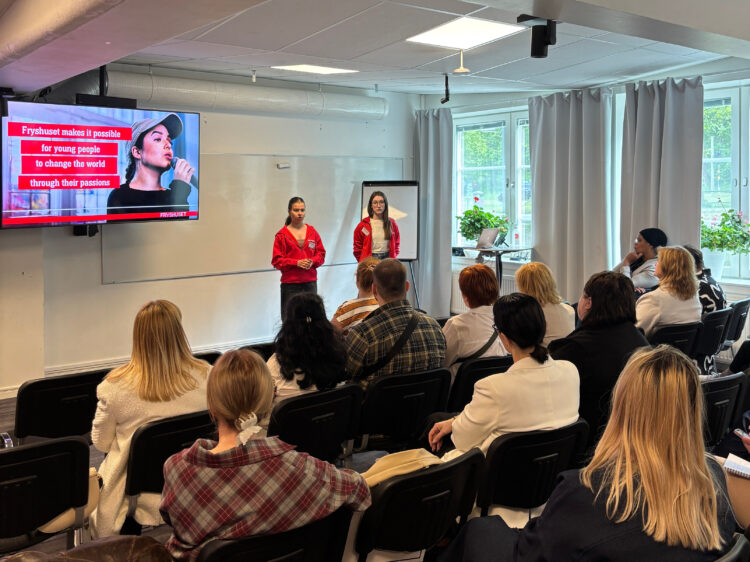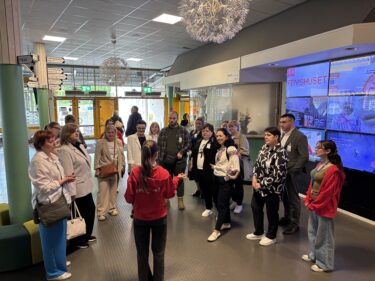
“These ideas are an inspiration for youth centers in Ukraine” — Employment Service Delegation Visits Fryshuset
A Ukrainian delegation visited Fryshuset in Stockholm to explore Swedish approaches to youth empowerment and employment. The delegation included representatives from the State Employment Service of Ukraine, the Ministry of Social Policy, United Nations Development Programme (UNDP), regional and city-level employment centers.
United by a shared purpose, the specialists aimed to learn how Swedish government institutions collaborate with civil society organizations — like Fryshuset — to support young people and improve their access to the labor market. Firstly, the delegation participated in a guided tour of Fryshuset, with a special focus on how the center fosters inclusion.
Then the visit centered on exploring how young people can be empowered to become leaders and role models within their communities. Discussions covered the following key themes:
- Barriers to employment: Participants explored the challenges faced by young people entering the workforce — particularly the lack of work experience — and discussed with young ESC representatives how initiatives like the European Solidarity Corps can help bridge the gap between education and employment.
- Labor market and entrepreneurship programmes: Representatives from Fryshuset presented the organization’s approach to supporting youth employment. This includes entrepreneurship programs, collaboration with the Swedish Employment Service, and a special emphasis on inclusion, ensuring that young people from diverse backgrounds — including those facing social or economic challenges — have equal opportunities to participate and succeed.
Together with Katarina Nilsson, Head of Knowledge Area for Work and Entrepreneurship at Fryshuset, participants learned about Fryshuset’s 4uvas project, which developed an innovative cross-sector collaboration model ensuring that young people neither working nor studying get personal support without falling through the cracks; the NextGen Solutions program, empowering especially young women to develop entrepreneurial skills through mentorship and business partnerships; and the X Factor initiative, creating short-term job opportunities by connecting youth with public and private sector actors.
- Public-civil cooperation: Throughout the exchange, both sides stressed the importance of building strong partnerships between government institutions and civil society organizations. This collaborative model was seen as a valuable approach for adapting and implementing similar solutions in Ukraine.
Olena Melnyk, Deputy Director of the Employment Policy Implementation Department at the State Employment Service of Ukraine, shared her thoughts on what Sweden and Ukraine can learn from each other in the area of youth employment and social inclusion:
“Ukraine can learn from Sweden about inter-institutional cooperation and the culture of trust in working with young people. For both countries, it is important to develop inclusion as a principle of “there is a place for everyone,” rather than as a standardized formula for support. Young people should be involved as equal partners in shaping policies and decisions.”

Olena also shared what ideas or approaches from Fryshuset could be relevant for Ukraine:
“For our work in Ukraine, approaches where young people are not treated as objects of help, but as agents of change, are especially relevant. In a country where young people are often left out of decision-making processes, it is important to create spaces where they can express themselves, feel trusted, and receive support.
The most valuable aspect of Fryshuset’s approach is accepting young people as they are, without pressure or judgment. Here, youth are not “corrected” but accepted and engaged. Building trust and relationships as the first step toward change — not through control or punishment, but through dialogue, mentorship, and support — is deeply impactful.
I was impressed by the multifunctional open space that provides opportunities for self-realization: music, sports, volunteering, education, talent development, and soft skills. Fryshuset actively employs and supports not only “successful” youth, but also those in difficult life circumstances, proving that informal approaches can be just as effective as official programs. These ideas are an inspiration for the development of youth centers in Ukraine — open, youth-friendly spaces that support initiatives and recognize young people as equal partners.”
Text: Anastasiia Savenko
Photo: Fryshuset